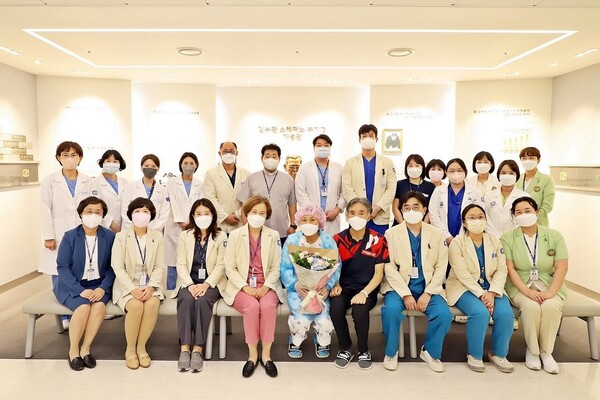
The Catholic University of Korea Eunpyeong St. Mary's Hospital said it successfully performed the first robotic kidney transplantation from a brain-dead donor for the first time in Korea.
In July, the renal pancreas transplantation team at the Stephen Cardinal Kim Institute of Eunpyeong St. Mary's Hospital transplanted a brain-dead donor’s kidney to a woman in her 50s who was suffering from chronic kidney disease using robotic surgery.
This is the first robotic transplant case since the opening of Eunpyeong St. Mary's Hospital in 2019.
The recipient had been on hemodialysis since 2014 due to chronic glomerulonephritis of unknown etiology. She was listed as a brain-dead donor kidney transplant candidate around the same time, and she received a kidney after a nine-year wait.
The patient recovered without any complications and was discharged from the hospital 12 days after surgery.
During the five-hour surgery, the transplant team placed the donor kidney into the abdominal cavity through a minimally invasive lower abdominal incision of about 6 cm and carefully anastomosed the blood vessels through four tiny 1-cm holes that the robotic arm could fit through.
Generally, a kidney transplant through open surgery requires an incision of about 20 cm, resulting in a relatively slow recovery and a large scar.
However, robotic kidney transplantation not only reduces patient pain, scarring, and surgical complications through a minimal incision but also enables surgeons to check blood vessels and ureters in detail by utilizing a 10 times larger view and freely moving robotic joints.
"Robotic kidney transplantation has been used for living donor transplantation in Korea, but we have confirmed that robotic kidney transplantation from a brain-dead donor is possible in the domestic medical environment depending on the vascular condition of the brain-dead donor and the recipient," said Hwang Jeong-ki, professor of vascular transplantation at the Stephen Cardinal Kim Institute.
About 40 percent of all kidney transplants in Korea are performed with brain-dead donor organs, according to Hwang.
“We hope that this surgery will serve as an opportunity to actively apply minimally invasive surgery to brain-dead donor transplants."
Eunpyeong St. Mary's Hospital opened the Stephen Cardinal Kim Institute in 2021 to spread the culture of organ donation and promote transplantation and has been performing difficult transplants such as small intestine transplants.

